
*
Judi Dench has certainly had enough adventures in her 54-year career to fill a compelling book or three. "And Furthermore" by Judi Dench (as told to John Miller) [St. Martin's Press] is not autobiography; rather, it fills in the gaps and continues the story told by Mr. Martin in his 2002 biography "Judi Dench: With a Crack in Her Voice" and by Ms. Dench and Mr. Martin in the 2007 follow-up "Scenes from My Life." And does so in a most entertaining manner. Ms. Dench takes us from one project to another, tells us an anecdote or two, and quickly moves on to the next. Famous names abound, of course, but Dame Judi doesn't seem interested in the fame; it's the character facets that catch her attention, thus giving us a refreshing look at life atop her various worlds.
*
| |
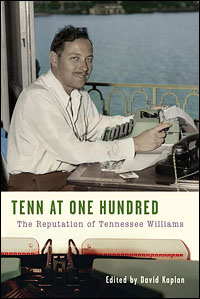 |
|
"Tennessee Williams and Company: His Essential Screen Actors" by John Di Leo looks at Williams' work by concentrating on 11 actors who played major roles in film versions of his plays. What does a look at the entire screen career of Vivien Leigh or Elizabeth Taylor tell us about Tennessee Williams, even if it does concentrate on their appearances in two or three Williams-derived films? Well, there is something to be said for it — but it might be seen as a bit of a stretch. At any rate, that's what Mr. DiLeo does, and conscientiously. And look at it this way: we get a full chapter on the career of Madeleine Sherwood, and where else are you going to find that? Besides Leigh, Taylor and Sherwood, we get Anna Magnani, Joanne Woodward, Geraldine Page and Mildred Dunnock; the male side is stronger, consisting of Brando, Newman, Burton and Karl Malden. Briefest and most unusual of the bunch is "Tennessee Williams in Provincetown" by David Kaplan. This tells of the playwright's four summers in Provincetown, beginning in 1940; at this point, he was 29 and awaiting the start of rehearsals of his first major play. (As it turned out, the Theatre Guild's production of Battle of Angels opened disastrously at the Wilbur in Boston and was quickly withdrawn.) What we get in Provincetown is the still young-and-struggling playwright. Mr. Kaplan ties together a narrative with the help of some old-time intimates of Tenn; one of them even dug a couple of eyebrow-raising photographs out of the ol' shoebox. Should you want to see a photo of Williams cavorting like Pan on the dunes without a bathing suit, this is the place to find it.
*
| |
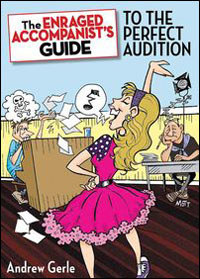 |
|
It is Mr. Gerle's theory that if you walk in feeling confident in what you are doing and how you are doing it, you will come out ahead. You might not get the part; you might simply not be what they are at that moment in time looking for, even if you give an exceptional audition. But a good audition is likely to be remembered — by directors, choreographers, casting directors, or even accompanists; the next time you walk in the room, they might even say to the others around the table, "this singer is good." A poor audition, a disorganized audition, a self-sabotaged audition; these are no help to anyone.
Mr. Gerle gives the reader "techniques, strategies, and customary practices to make the experience as familiar and comfortable as possible." His aim: "you will, at the very least, have an audition experience that is vastly more relaxed and enjoyable for everyone than 90 percent of your competition." Easier said than done; but every little bit helps, no? "The Enraged Accompanist's Guide to the Perfect Audition" says it all in a friendly and entertaining manner, for 17 bucks.
| |
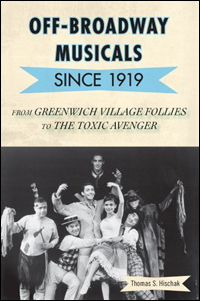 |
|
*
| |
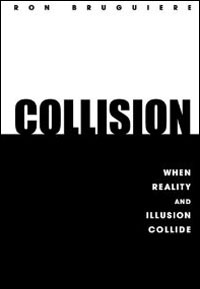 |
|
Bruguiere started his career ushering at Wildcat in 1960; graduated to summer stock at the Cape Cod Melody Tent in 1961, where he was personally in charge of a celebrity apprentice (named Liza) and his duties included sneaking her mother (named Judy) surreptitiously into the theatre when she wanted to see the show; served as company manager of Richard Rodgers-produced Music Theater of Lincoln Center series; became general manager of ANTA, and house manager of the ANTA Theatre; served as company manager on shows like the original production of Hair and the successful Maggie Smith tour of Private Lives; and wound up his career in Los Angeles, with 25 years as house manager of the Mark Taper and then the Dorothy Chandler Pavilion.
It is impossible for me to gauge the reactions of the general reader; I found "Collision" steadily interesting and a quick read, but I spent many years in the same profession and worked with many of the same people. Bruguiere offers numerous glimpses of life within the business end of the legitimate theatre, and the sort of closeup view of performers like Carol Channing, Ethel Merman, Deborah Kerr, and especially Ms. Smith (with whom he apparently had a strange and unresolved relationship), that only a manager can give you. *
| |
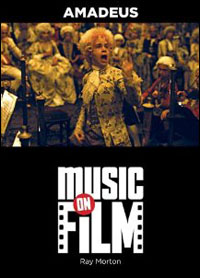 |
|
(Steven Suskin is author of the recently released updated and expanded Fourth Edition of "Show Tunes" as well as "The Sound of Broadway Music: A Book of Orchestrators and Orchestrations," "Second Act Trouble" and the "Opening Night on Broadway" books. He also pens Playbill.com's On the Record and DVD Shelf columns. He can be reached at Ssuskin@aol.com.)
*
Passionate about theatre books? See what the Playbill Store has on its shelves.


-Matthew-Murphy.jpg)







